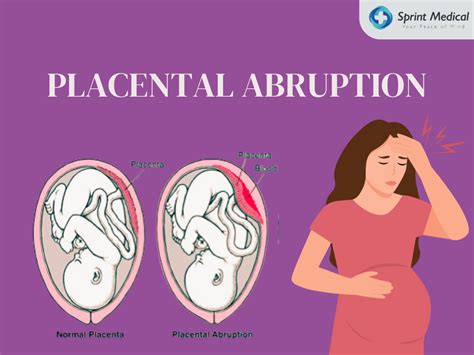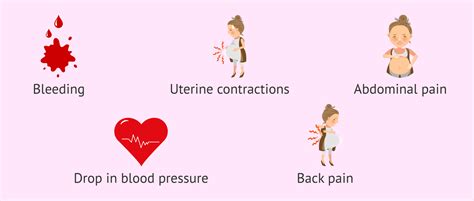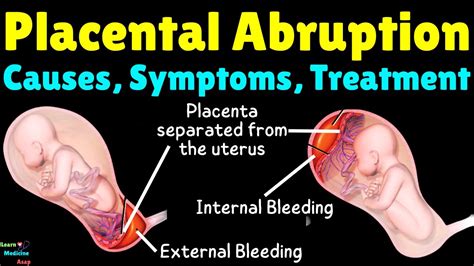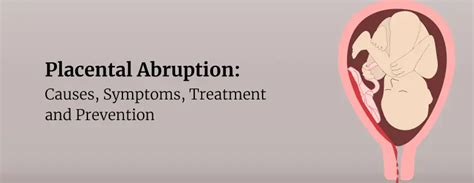Intro
Learn about Placental Abruption Symptoms, causes, and treatment. Identify signs of placental abruption, bleeding, and premature birth risks with related conditions like preeclampsia and fetal distress.
Placental abruption is a serious pregnancy complication that occurs when the placenta partially or completely separates from the uterus. This condition can deprive the baby of oxygen and nutrients and cause severe bleeding that can be life-threatening to both the mother and the baby. It is essential to recognize the symptoms of placental abruption to seek immediate medical attention.
Placental abruption can occur suddenly and without warning, making it crucial for pregnant women to be aware of the risks and symptoms. The condition is more common in women who have had previous uterine surgery, have a history of high blood pressure, or have experienced trauma to the abdomen. Additionally, women who smoke or use cocaine during pregnancy are also at a higher risk of developing placental abruption.
The importance of recognizing the symptoms of placental abruption cannot be overstated. Prompt medical attention can help prevent serious complications and ensure the best possible outcome for both the mother and the baby. In this article, we will discuss the symptoms, causes, and treatment options for placental abruption, as well as provide guidance on how to prevent this condition.
Understanding Placental Abruption

Causes of Placental Abruption
The exact cause of placental abruption is not always clear, but several factors can increase the risk of developing this condition. These include: * Previous uterine surgery, such as a cesarean section * High blood pressure * Trauma to the abdomen * Smoking or using cocaine during pregnancy * Multiple pregnancy (carrying twins or triplets) * Placenta previa (a condition where the placenta covers the cervix) * History of placental abruption in a previous pregnancySymptoms of Placental Abruption

Risk Factors for Placental Abruption
Several risk factors can increase the likelihood of developing placental abruption. These include: * Age: Women over 35 years old are at a higher risk of developing placental abruption * High blood pressure: Women with high blood pressure are at a higher risk of developing placental abruption * Previous uterine surgery: Women who have had previous uterine surgery, such as a cesarean section, are at a higher risk of developing placental abruption * Smoking or using cocaine during pregnancy: Women who smoke or use cocaine during pregnancy are at a higher risk of developing placental abruption * Multiple pregnancy: Women carrying twins or triplets are at a higher risk of developing placental abruptionDiagnosing Placental Abruption

Treatment Options for Placental Abruption
The treatment for placental abruption depends on the severity of the condition and the gestational age of the baby. Some possible treatment options include: * Bed rest: Women with mild placental abruption may be advised to rest in bed to reduce the risk of further bleeding * Hospitalization: Women with severe placental abruption may need to be hospitalized to monitor the baby's health and prevent further complications * Blood transfusions: Women who are experiencing severe bleeding may need blood transfusions to replace lost blood * Delivery: In some cases, the baby may need to be delivered immediately, either vaginally or by cesarean sectionPreventing Placental Abruption

Conclusion and Next Steps
Placental abruption is a serious pregnancy complication that can have severe consequences for both the mother and the baby. Recognizing the symptoms of placental abruption and seeking immediate medical attention can help prevent serious complications and ensure the best possible outcome. Women who are at risk of developing placental abruption should work closely with their healthcare provider to monitor their condition and take steps to reduce their risk.What are the symptoms of placental abruption?
+The symptoms of placental abruption can include vaginal bleeding, severe abdominal pain, back pain, uterine tenderness, and fetal distress.
What are the risk factors for placental abruption?
+Risk factors for placental abruption include age, high blood pressure, previous uterine surgery, smoking or using cocaine during pregnancy, and multiple pregnancy.
How is placental abruption diagnosed?
+Placental abruption can be diagnosed using ultrasound, fetal heart rate monitoring, and blood tests.
What are the treatment options for placental abruption?
+Treatment options for placental abruption depend on the severity of the condition and the gestational age of the baby, and may include bed rest, hospitalization, blood transfusions, and delivery.
Can placental abruption be prevented?
+While it is not always possible to prevent placental abruption, women can take steps to reduce their risk by quitting smoking, avoiding cocaine, managing high blood pressure, and avoiding trauma to the abdomen.
